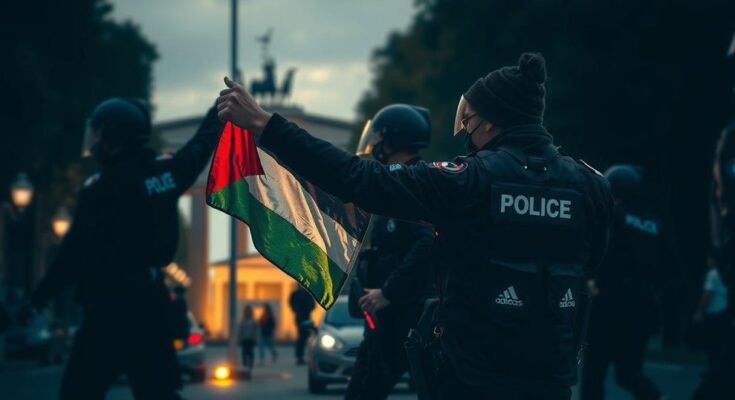In a striking scene captured at Berlin’s Breitscheidplatz, an 11-year-old boy clutching a Palestinian flag has ignited a firestorm of debate across social media platforms. The video, which has captivated millions within a day, depicts the child sprinting through the square under the pursuit of several police officers, ultimately encircling him in a tense moment that has led to a chorus of accusations against German law enforcement. Anti-Israel activists quickly framed this as an emblematic act of injustice, suggesting that the mere presence of the flag warranted such drastic measures, dubbing authorities as ‘German fascists’ in the process. However, the narrative is not as straightforward as it appears. While the Berlin police remain largely silent, their initial online comments clarify that the boy had allegedly participated in a demonstration without adequate supervision—an event marred by instances of vandalism, violence, and displays of banned symbols linked to terrorism. The police clarified that the boy’s detainment was not an arrest but a protective measure, as he was released into his father’s care after 90 minutes. What adds a troubling layer to this incident is the revelation that this young boy has been repeatedly utilized by older, politically charged individuals at protests, amplifying a carefully curated message of provocation. Witnesses have noted the boy being sent by masked adults to confront outspoken political figures like Karoline Preiser, who, armed with signs denouncing violence, stand against the swell of animosity. The child, under the guidance of these older agitators, has been embroiled in creating confrontational spectacles aimed at journalists and counter-protesters. This unsettling trend echoes a phenomenon seen in conflict zones, where children are orchestrated as pawns in political narratives, often thrust into dangerous situations to evoke sympathy and illustrate a stark contrast against perceived aggressor forces. Uwe Becker, an anti-Semitism commissioner, voiced his concerns by denouncing the intentional indoctrination of children into a world steeped in hate, suggesting that the societal implications of such practices could lead to an insidious cycle of prejudice. Berlin’s demonstration did not end with just this one incident; a total of 79 individuals faced restrictions, leading to 85 criminal complaints that spanned offenses from assault on police to property damage. The turbulence of this event underscores a complex and troubling narrative regarding child manipulation and political protest, a story that extends beyond borders to influence perceptions far and wide.
Original Source: www.bild.de
